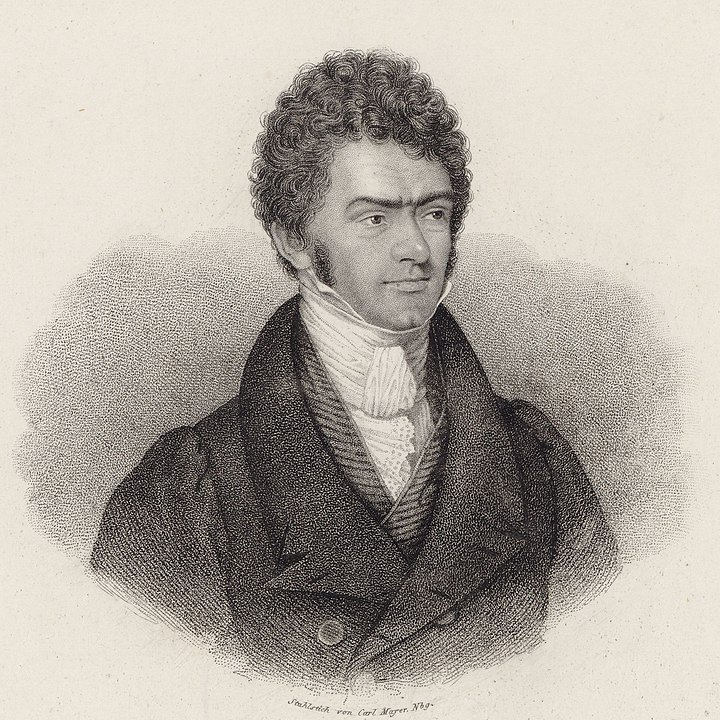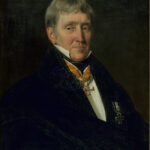Ferdinand Ries (1784-1838) was Beethoven’s pupil, secretary and loyal friend. He was a talented pianist and went on to compose 180 works. Like Beethoven, Ries was also born in Bonn. He journeyed to Vienna at the age of 19 to learn from the great composer.
In 1838, Ries and Beethoven’s friend Franz Wegeler published a joint effort biographical text, filled with recollections of their time spent with the legendary composer. It is regarded to be a highly reliable source of valuable information.
In this article, we introduce Ries as Beethoven’s loyal companion, lifelong champion and talented musician in his own right. Interestingly, the composer travelled all over Europe; therefore, we will follow his footsteps across the continent, to give you an outline of his fascinating life.
Dedicated mentor, grateful student
Ries was born into a musical family in Bonn. His grandfather played the trumpet, his father and brothers played the violin. His father was his first piano teacher; later, Bernhard Romberg became his tutor, whom he would join on tour to play together with, a number of years after.
Ries was living in Munich and working as a music copyist, struggling to get by, when his father decided to send him to Vienna along with the request of tutelage to Beethoven. The composer accepted Ries as his student, because his father had been very generous and supportive at the time Beethoven’s mother died.
Beethoven also arranged for Ries to have lessons with his former master Johann George Albrechtsberger for counterpoint and composition, and secured him positions as a tutor with wealthy families. His first public performance in 1804 was very well received. He played Beethoven’s C minor concerto, and was allowed to compose his own solo to close the piece.
Ries, Beethoven’s secretary
Ries must have revealed his competence in organizational matters early on, as he soon became indispensable to Beethoven as his secretary. He copied music, ran errands, corresponded with publishers and even secured the composer his accommodation, the top floor flat in the Pasqualati House, where he spent many years. This space is now a museum. Beethoven liked living there because he had great views of the countryside.
Follow the link to learn more about the interesting history of this residence, and its landlord, Baron Johann Baptiste von Pasqualati of Osterberg.
| Related: Beethoven residences: the Pasqualati House
Ries travelled and lived abroad a lot from 1805 onwards, however, he remained in touch with Beethoven all the while. During over a decade spent in London, his efforts to promote Beethoven and arrange for the publication of his masterpieces were instrumental. He also secured the commission for his 9th Symphony.
Bonn – Paris – Vienna
In 1805 Ries returned to Bonn, reporting for duty, having been conscripted by the French revolutionary army. As a child, smallpox infection had left Ries with loss of sight in one eye, therefore he avoided being drafted.
After a year in Bonn with his family, busily composing, and two in Paris, Ries returned to Vienna in 1808. During this year in Vienna, Ries assisted Beethoven in the first performances of the 5th and 6th Symphonies.
Bonn – Russia – London
In 1809, Ries returned to Bonn to avoid conscription, this time because the Austrian army was drafting all forces to defend Vienna from Napoleon.
In 1811, Ries began a tour of Europe, giving concerts in a number of major cities all the way to St. Petersburg. He had written two piano concertos for this trip. Here he met his piano teacher from Bonn, Bernhard Romberg, and together they continued to give performances in Russia.
A year later, Napoleon invaded Russia, therefore Ries made his way back across Europe, with London as his final destination in 1813.
The London years
Ries lived in England for over a decade. He made the acquaintance of Johann Peter Salomon, who had played with his father at the court in Bonn. Salamon, most famously, had introduced Haydn to the English, and they adored him!
Ries received praise for his performances in the Philharmonic orchestra, which Salamon invited him to play in. In 1815 he became a member and shortly after, a director at the Philharmonic Society.
Ries was also a respected teacher in London. Alongside his commitments as a performer, Ries assisted Beethoven in no small way to garner support for his friend and master, and publish his pieces. Most of his own orchestral compositions were written during his time in England.
(Salamon was buried in Westminster Abbey, honoured in this way for the service of bringing Haydn to London, who was greatly appreciated and loved in England.)
Ries married the English Harriet Mangeon, and they had 3 children together. In his final years in England, Ries found himself underappreciated and ready to move on, following some disagreements within the Philharmonic Society. In 1824, he and his family returned to the continent.
Return to the continent
Ries continued to compose, and he also became a conductor. At the German premiere in 1825 in Aachen, Ries conducted Beethoven’s 9th Symphony. In the following years, Ries wrote 5 string quartets. He also wrote operas, which were much liked by their audience in Frankfurt, his new home town.
One final spin round Europe: Italy – France – England
Ries made what was to be his final concert tour in the company of his wife, travelling to many cities in Italy. He wrote his last piano concerto, piano sonata and string quartet during this time. A few years later he visited Paris, where he composed his final orchestral work, which he premiered in London shortly after with the Philharmonic Society orchestra in 1837.
Ries died in Frankfurt in 1838, following an unknown, short illness.
In their biography of Beethoven, Ries and Wegeler gifted us with many anecdotes and valuable information, and copies of correspondence. These men of integrity and true friends of Beethoven, remember him with warmth and respect.
The full title of the book is:
Beethoven Remembered: The Biographical Notes of Franz Wegeler and Ferdinand Ries
A.K.




